OpenAI Unveils Sora, an AI-Powered Text-to-Video Generator Capable of Creating One-Minute-Long Clips
OpenAI said Sora can create multiple shots within a single generated video.

Photo Credit: X/Sam Altman
Sora uses a transformer architecture similar to GPT models
OpenAI, the company behind ChatGPT, introduced its first artificial intelligence (AI)-powered text-to-video generation model Sora on Thursday. The company claims it can generate up to 60-second-long videos. This is longer than any of its competitors in the segment, including Google's Lumiere, which was unveiled last month. Sora is currently available to red teamers, cybersecurity experts who extensively test software to help companies improve their software, and some content creators. The AI firm also plans to include Coalition for Content Provenance and Authenticity (C2PA) metadata in the future once the model is deployed in an OpenAI product.
Announcing the AI video generator in a post on X (formerly known as Twitter), the company said, “Sora can create videos of up to 60 seconds featuring highly detailed scenes, complex camera motion, and multiple characters with vibrant emotions.” Interestingly, the length of the video it claims to generate is more than ten times of what its rivals offer. Google's Lumiere can generate 5-second-long videos, whereas Runway AI and Pika 1.0 can generate 4-second and 3-second-long videos, respectively.
Prompt: “A movie trailer featuring the adventures of the 30 year old space man wearing a red wool knitted motorcycle helmet, blue sky, salt desert, cinematic style, shot on 35mm film, vivid colors.” pic.twitter.com/0JzpwPUGPB
— OpenAI (@OpenAI) February 15, 2024
The X account of OpenAI and CEO Sam Altman also shared multiple videos generated by Sora, along with the prompts used to create them. The resulting videos appear highly detailed with seamless motion, something other video generators in the market have somewhat struggled with. As per the company, it can generate complex scenes with multiple characters, multiple camera angles, specific types of motion, and accurate details of the subject and background. This is possible because the text-to-video model uses both the prompt as well as “how those things exist in the physical world.”
welcome to bling zoo! this is a single video generated by sora, shot changes and all. https://t.co/81ZhYX4gru pic.twitter.com/rnxWXY71Gr
— Bill Peebles (@billpeeb) February 15, 2024
Sora is essentially a diffusion model which uses a transformer architecture similar to GPT models. Similarly, the data it consumes and generates is represented in a term called patches, which is again akin to tokens in text-generating models. Patches are collections of videos and images, bundled in small portions, as per the company. Using this visual data enabled OpenAI to train the video generation model in different durations, resolutions and aspect ratios. In addition to text-to-video generation, Sora can also take a still image and generate a video from it.
However, it is not without flaws either. OpenAI stated on its website, “The current model has weaknesses. It may struggle with accurately simulating the physics of a complex scene, and may not understand specific instances of cause and effect. For example, a person might take a bite out of a cookie, but afterwards, the cookie may not have a bite mark.”
Prompt: “Animated scene features a close-up of a short fluffy monster kneeling beside a melting red candle. the art style is 3d and realistic, with a focus on lighting and texture. the mood of the painting is one of wonder and curiosity, as the monster gazes at the flame with… pic.twitter.com/aLMgJPI0y6
— OpenAI (@OpenAI) February 15, 2024
To ensure the AI tool is not used for creating deepfakes or other harmful content, the company is building tools to help detect misleading content. It also plans to use C2PA metadata in the generated videos, after adopting the practice for its DALL-E 3 model recently. It is also working with red teamers, especially domain experts in areas of misinformation, hateful content, and bias, to improve the model.
At present, it is only available to the red teamers and a small number of visual artists, designers, and filmmakers to gain feedback about the product.
Get your daily dose of tech news, reviews, and insights, in under 80 characters on Gadgets 360 Turbo. Connect with fellow tech lovers on our Forum. Follow us on X, Facebook, WhatsApp, Threads and Google News for instant updates. Catch all the action on our YouTube channel.
Related Stories
- Samsung Galaxy Unpacked 2025
- ChatGPT
- Redmi Note 14 Pro+
- iPhone 16
- Apple Vision Pro
- Oneplus 12
- OnePlus Nord CE 3 Lite 5G
- iPhone 13
- Xiaomi 14 Pro
- Oppo Find N3
- Tecno Spark Go (2023)
- Realme V30
- Best Phones Under 25000
- Samsung Galaxy S24 Series
- Cryptocurrency
- iQoo 12
- Samsung Galaxy S24 Ultra
- Giottus
- Samsung Galaxy Z Flip 5
- Apple 'Scary Fast'
- Housefull 5
- GoPro Hero 12 Black Review
- Invincible Season 2
- JioGlass
- HD Ready TV
- Laptop Under 50000
- Smartwatch Under 10000
- Latest Mobile Phones
- Compare Phones
- Realme Neo 8
- OPPO Reno 15 FS
- Red Magic 11 Air
- Honor Magic 8 RSR Porsche Design
- Honor Magic 8 Pro Air
- Infinix Note Edge
- Lava Blaze Duo 3
- Tecno Spark Go 3
- HP HyperX Omen 15
- Acer Chromebook 311 (2026)
- Lenovo Idea Tab Plus
- Realme Pad 3
- HMD Watch P1
- HMD Watch X1
- Haier H5E Series
- Acerpure Nitro Z Series 100-inch QLED TV
- Asus ROG Ally
- Nintendo Switch Lite
- Haier 1.6 Ton 5 Star Inverter Split AC (HSU19G-MZAID5BN-INV)
- Haier 1.6 Ton 5 Star Inverter Split AC (HSU19G-MZAIM5BN-INV)

















